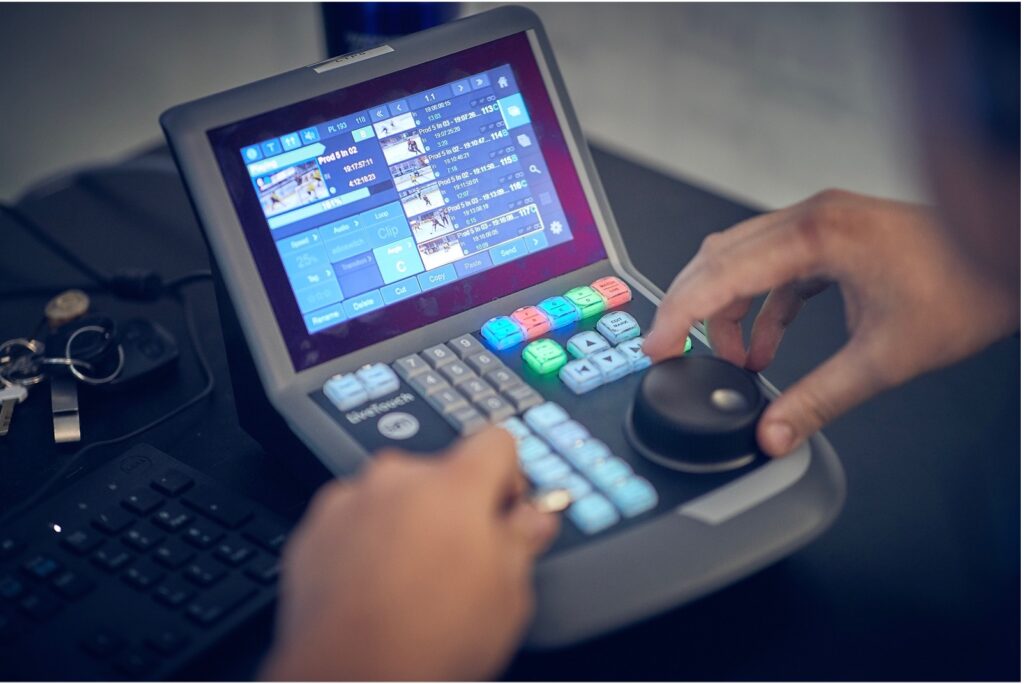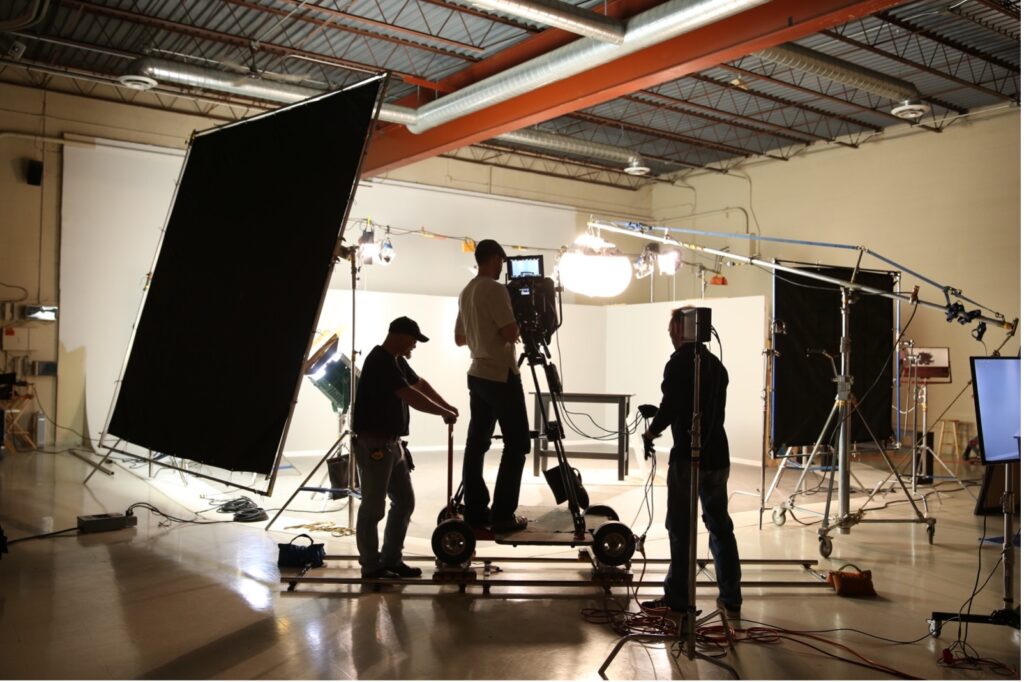
Working with a team of professionals to assist in the production and delivery of TV/Radio shows. Sound exciting? This level 3 Broadcast Production Assistant role could be the start of your new career!
The role and salary for a level 3 Broadcast Production Assistant Apprentice
The Broadcast Production Assistant provides key support to both editorial and technical colleagues which ensures the smooth delivery of content for TV and radio productions. These productions can be anything from factual to comedy and everything in between. Candidates will work as part of a production team and need to be both adaptable and willing to learn on the job. Broadcast production assistants may plan projects, events, manage guests, obtain equipment and importantly, manage resources (including finance). They may also be involved in operational areas such as camera, lighting, sound, and editing. For commercial sectors, it may be their job to develop branding, commercials and work closely with marketers.
The average Broadcast Production Assistant salary in the UK is between £15k – £18k but that can change very quickly as you start progressing through your career and into new positions. The Broadcast Production Assistant apprenticeship is a window of opportunity into a wide range of production roles within the commercial environment, a career choice that offers room for movement within the entertainment industry.
Pathways and requirements
Broadcast Production Assistants can progress into TV or radio creative, production management, or editing roles, such as Researcher, Production Co-ordinator, or Editorial Co-ordinator.
Regarding qualifications, apprentices without level 2 English and Maths will need to achieve this level prior to taking the end-point assessment. Employers will often set their own criteria for entry, but this can include 5 or more GCSE’s A* – C.

Broadcast Production Assistant: Core skills and knowledge
The apprentice’s job role will consist of responsibilities that will fulfill a range of competencies. These include:
Production Planning – skills
- How new productions in TV/Radio are commissioned
- The differences between genre and the type of production
- TV/Radio production being developed
- How to use tools and techniques to research ideas and concepts for a TV/Radio production
- How to work within a budget allocation for a production
- The legislation that may apply to cast and crew on productions including health and safety, licenses, working time directive
Knowledge
- Follow the commissioning process for TV/Radio productions
- Interpret the production brief, research and identify the audience for the TV/Radio production
- Research and develop creative ideas and concepts for a TV/Radio production
- Present persuasive ideas, pitches and proposals for TV/Radio productions
- Identify and assist with sourcing resources for a TV/Radio production including equipment, crew, budget and existing media assets
Production Development – skills
- Use tools to research the methods and tools that underpin the development of creative thinking
- The different styles of writing that can be used according to the genre of production
- How to establish the appropriate tone of voice for a TV/Radio production
- The end-to-end production workflow process, the key stages, and own role within this
- The regulatory and legal requirements when using media assets such as copyright, intellectual property rights etc
- How to gather data to evaluate the success of a TV/Radio production against its objectives
Knowledge
- Work to a commission to develop content for TV/Radio
- Write a brief for a production, or storyboard and outline script their ideas
- Operate effectively within the production workflow
- Obtain media assets for use within the TV/Radio production
- Apply copyright/intellectual property rights to media assets
- Clear copyright for productions
- Develop and maintain positive working relationships when in production
- Use lessons learned to evaluate the success of the TV / Radio production and identify areas for improvement for future productions
Industry Awareness – skills
- How to manage and market your own skills and services
- The structure and culture of broadcasters, creative media organisations and the wider creative industry.
- Commercial pressures, production deadlines and organisational working practices
- The safe use of equipment on TV/Radio Productions
Knowledge
- Develop, maintain and use professional networks
- Develop and maintain own competence and knowledge in specialist broadcast areas
- Follow health & safety procedures when on a production
- Identify and minimise hazards and risks in the workplace
Content Creation – skills
- The principles of grammar, punctuation and spelling
- How to capture video, pictures, graphics and sound from various formats, in preparation for non-linear editing
- How to prepare for and conduct interviews
- How to identify media assets from various sources
- How to manipulate media assets
Knowledge
- Write and edit scripts and cues for use in TV/Radio productions
- Capture images and record audio on location or in a studio
- Maintain records of material produced and its location using production logs
- Prepare media assets for use in TV / Radio productions
- Assist with co-ordinating productions end to end

Specialist skills and knowledge
The apprentice must demonstrate competence in three of the below areas. These have been tailored specifically to the needs of the role and the broadcast employer.
Editing and post-production – skills
- How the editing approach affects the production of the final content
- How to securely store and access media assets
- How to archive, conserve and preserve media assets
Knowledge
- Assist with importing and editing of media content from files/drives (ingest)
- Use industry standard packages to carry out basic edits and post produce media content
- Edit, process and mix audio assets
- Manage and store media assets correctly
Technical support – skills
- The procedures for obtaining technical equipment
- How to set up and de-rig technical equipment
Knowledge
- Obtain, prepare, and return technical equipment for use on TV / Radio productions
- Operate technical equipment in the studio and on location
Production co-ordination – skills
- The procedures to follow when sourcing locations, catering, accommodation and transport for productions
- The processes to follow when monitoring resources and budgets on productions
Knowledge
- Identify and source locations, catering accommodation and transport, fora TV/ Radio production
- Monitor the production budget and resources
- Complete and maintain production documentation
Live content creation – skills
- How to successfully produce and broadcast live events for TV/Radio
- How to work with transmission and broadcast engineering service partners for live broadcast
Knowledge
- Assist with the production of live programming for TV/Radio
- Work with transmission and broadcast engineering services to broadcast live content
Commercial – skills
- Awareness of branding guidelines
- The importance of branding for TV and Radio
- How to develop and produce trails, promos and commercials
Knowledge
- Support the production of branding, promos, trails and commercials for TV / Radio
- Support the end-to-end production of sponsored/branded content

Broadcast Production Assistant behaviours and exams
To complete the Broadcast Production Assistant qualification, you must demonstrate the following behaviours and required knowledge to work within a wide range of production disciplines, in a safe and professional manner.
- A passion for developing and producing content for TV/Radio productions
- An ability to work effectively both individually and collaboratively as part of a production team
- An ability to think critically and creatively
- Working in an ethical and sustainable manner
- A strong work ethic and commitment in order to meet the standards required
- Recognition of and compliance with equality and diversity in the workplace
In order to complete the qualification successfully you must demonstrate your skills and knowledge gained throughout the apprenticeship. The apprentice will be required to complete an EPA (End-point assessment) to show they are fully competent in their occupational job role. The EPA is made up of three assessment tools:
- Knowledge Test
- Practical Test
- Structured Interview
Further detail on the End-point assessment can be found in the Broadcast Production Assessment Assistant document here: https://www.instituteforapprenticeships.org/media/1158/broadcast_production_assistant.pdf
Conclusion
Broadcast production assistants are in demand because without them no new media
content would ever find its way onto our screens. They are equally happy on set where the
filming happens, presenting ideas to commissioning editors, or at their desks mastering
technology around end-to-end content creation. If you are reading this blog you will have
picked up on the really vital skills for success in this career: You must be able to write well
and think creatively, be capable of managing a wide range of people and resources to
make a production run smoothly, follow processes, present ideas, and develop a
commercial mindset to predict, monitor and evaluate success of new productions. You
need to be comfortable around using new technology, and adept at relationship skills – as
you progress you will be pulling people together to work as one team with an agreed vision
and purpose. If you want to start thinking like a Broadcast Production professional, start by
paying attention to anything you watch on a screen and ask yourself a few simple
questions: Why will people want to watch this, who are they, when will they watch and on
which channels?
Click here for the latest apprenticeship news and articles.
Take another look around our website, check out our social platforms, and sign up to our weekly newsletter for updates on your favourite apprenticeship opportunities.



